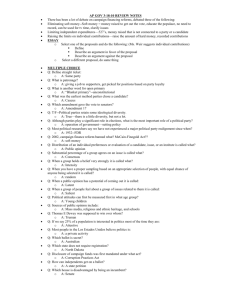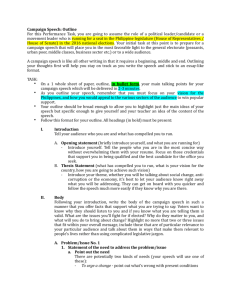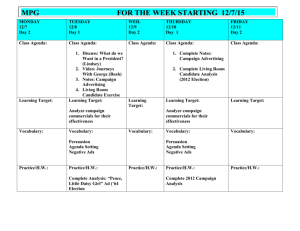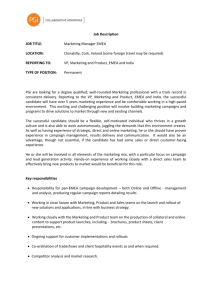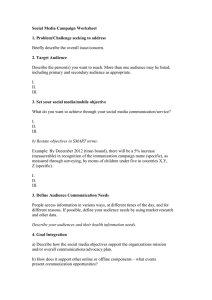Political Science Study Guide
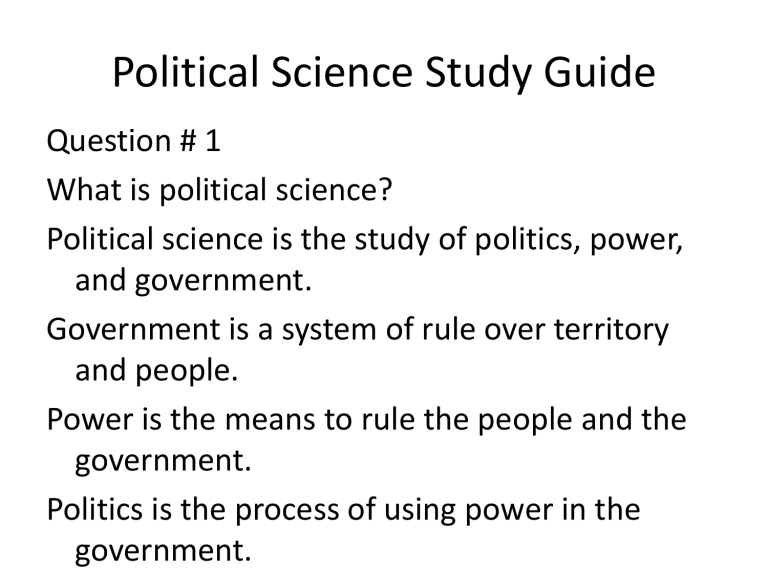
Political Science Study Guide
Question # 1
What is political science?
Political science is the study of politics, power, and government.
Government is a system of rule over territory and people.
Power is the means to rule the people and the government.
Politics is the process of using power in the government.
Political Science
Political scientists will try to determine how political science effects your lives by doing a number of different things.
They conduct interviews of those people in office.
They analyze information about the people and the government.
They also conduct surveys to gather information on public opinion.
Political Science
Give some examples of how the government has an affect upon your life?
Think of the things that you do each day and try to determine which of those things government is not involved in.
Is government too involved in your lives or do you really not notice the impact that government has on you?
Should there be more government involvement?
Political Science
Question # 2
What is a constitution?
A constitution is a general outline of the government and how the government is supposed to work.
When was the U.S. constitution written?
Is it working?
If yes give a couple of examples.
If not give a couple of examples.
Political Science
What are the four major parts to a constitution?
1. Preamble-introduction why the government exists.
2. Structure-how is the government set up.
What offices are in place, how are these people replaced?
3. Rights and roles of the citizens. The Bill of
Rights in the U.S. constitution.
4. How can the document be amended or changed?
Experiment 8-A Handout
Political Science
Question # 3
Democracy-direct rule by the people. The United
States is a form of democracy called a representative democracy or Republic because we elect people to make decisions for us. We have too many people to make a direct democracy work.
Oligarchy-rule by a few. Generally done by force or threat of force. This often exists in third world countries where people are poor.
Political Science
Monarchy- rule by royalty. A monarch holds a title such as King or Queen and is often thought to be a representative of God himself.
The job of the royal family is to rule.
Dictatorship-rule by one or a few. This one person or group usually has unlimited power in their country. They also rule by force allowing little or no opposition. Communist countries are good examples of this.
Political Science
Anarchy is not really a form of government. In fact it is the lack of government.
Usually this does not exist for very long because someone or some group will emerge that will attempt to put things in order. The reason is that anarchy is associated with chaos and lack of stability in a country.
All of these forms of government derive their origins from the Greek and Romans.
Experiment 8-B Text page 412
Political Science
Question # 4
What is a treaty?
A treaty is an agreement between two or more nations.
It’s purpose is to establish a positive relationship between those countries involved in the treaty and each country expects to get something out of the treaty.
Treaties may be based on trade, military, mutual issues or virtually anything both countries want.
Experiment 8-C Text page 414-424 and handouts
Political Science
Question # 5
What are priorities?
A priority is something that is so important that it will usually come before all other things. You constantly prioritize your life as does a country.
In a democracy the number one priority are the needs of the people?
What might that list include?
Who decides if then indeed something is a priority?
How can you make your wishes known?
Experiment 8-D and 8-E
Political Science
Question # 6
What are the five major positions on the political spectrum?
The three main groups on the spectrum are:
Liberals– Moderates--Conservatives
Liberals generally would like to see change to bring about new things.
Conservatives want to keep things the same.
Moderates may go either way depending upon the issue.
Which do you think you are? Why?
Political Science
Two other groups also fall into the spectrum
Revolutionaries----Reactionaries
Revolutionaries are extreme liberals. They want change and they want it right now. If it means a revolution to get there they will support that.
Reactionaries are extreme conservatives. They believe that the old times are good enough, as a matter of fact they will push to go back in time if possible.
Experiment 8-F Handout
Political Science
Question # 7
The government of the United States is a republic.
We elect officials to represent us in the places where government meets. Therefore we are also known as a representative democracy.
Remember that the basis for a democracy is to serve the needs of the people, with that in mind the structure of our government was put into place. It contains the following features:
Political Science
A separation of powers. This divided the federal and state governments into three branches.
1. Legislative branch-to make the laws.
2. An executive branch-to enforce the laws.
3. A judicial branch-to interpret the laws.
A system of checks and balances was put into place to insure that no one branch would have more power than the other.
Examples?
Political Science
As well a division of powers was created. This was a separation between the power of the state and federal governments.
These powers were called:
Delegated powers-these were powers given to the federal government by the states.
Reserved powers-these powers were kept by the states and the federal government had no control over them.
Concurrent powers-both the states and the federal government share these.
Please give examples of each of the categories.
Political Science
The executive departments or the cabinet was put into place to give the government advice on the issues facing it.
The four original departments were the:
State department-in charge of foreign affairs.
Defense department-in charge of the military
Justice department-in charge of laws.
Treasury department-in charge of currency.
The government has added eleven more departments.
What is the most recent?
Political Science
Question # 8
In our structure of government people are elected to hold political office. These candidates strive to win these elections by conducting campaigns. In the campaign the candidate will outline what they expect to do if elected, their platform, and how their election will be better for the people.
Campaigns are expensive and require the expertise of lots of people including the following:
Political Science
Candidate-this is the person running for office.
That person will need to meet a number of criteria to run, like age, residency, legal status, signed support and filing your petition for candidacy with the proper elections board. The petition is the official form requesting your desire to run for office. It will often times require a number of signatures.
Campaign manager-often times in major elections a candidate will hire someone to run their campaign. The campaign manager is responsible for all aspects of the campaign including the outcome which should be victory. Who was the campaign manager for John McCain in 08?
Political Science
Researcher-the candidate will hire one or several individuals to research information about key issues. That information will be used when the candidate answers questions. This information is especially important if the candidates are involved in a debate over the major issues.
To come across to the public as knowledgeable about the issues to the general public is important in the election process.
How about writing cheat notes on your hand like
Sarah Palin did?
Political Science
Special interest groups are focused on one issue.
An example might be the NRA, the national rifle association, their primary interest is the right for all people to own a gun. They donated a lot of money to the John McCain campaign to try to get him elected, 25 million in 08.
Candidates will promise the special interest groups results if they are elected in exchange for money to run their campaigns.
Political Science
The media is often referred to as the fifth branch of the government. That is because of the influence that the media has on the general public. The media can choose to present a candidate to the American public in a certain way. The media is usually thought to promote more liberal candidates over the more conservative.
Public relations is a big part of the media simply from the standpoint of exposure to the general public. The candidate wants to have a positive image with the general public.
As well a candidate will seek endorsements from famous people to help their campaigns.
Did the selection of Sarah Palin in 08 hurt John McCain?
Political Science
Question 8 asks how money is important in a campaign.
Lets look at the presidential campaign in 08.
Barack Obama spent 740.6 million.
John McCain spent 959.4 million.
Grand total spent on that campaign to become
President, 1.7 billion dollars.
That money buys TV time, pays for travel, pays all of the staff, and covers hundreds of other expenses associated with running a campaign.
Bottom line you better have money to run for a major political office.
Political Science
All of the money is spent to try to get the constituents to vote for you. The constituents are the people that you are going to represent. That can be a few thousand people or it can be millions, as is the case of the Presidency.
Your platform or campaign views and priorities must be shared by at least 50% of the voters.
Remember not everyone votes. If not you will not win.
Political Science
Question # 9
What are some factors on which you should base your vote?
Thinking about what we just covered what would these be?
What makes a person a “good” candidate?
Again thinking back to what we just covered how would you answer this question?
Experiment 8-I Handout Crossword for Review
Political Science
Question # 10
What are some career opportunities in Political
Science?
A politician. This individual is elected by their constituents to make political decisions for them.
Teachers at the high school and college level.
Researchers for campaigns.
Campaign managers.
Part of the workforce in government.
Are you a born politician???????
